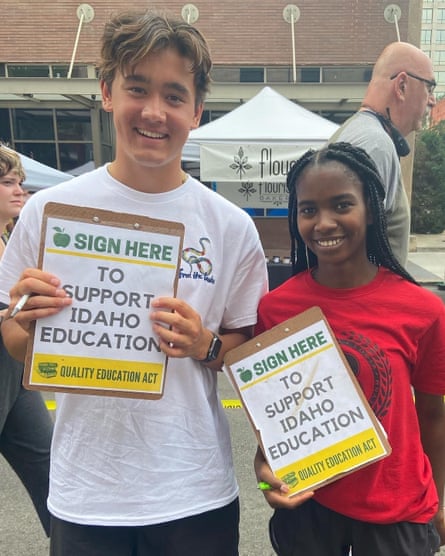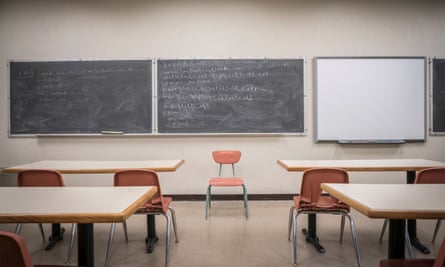yeshiva Rajbhandari wasn’t even of legal voting age when he decided to take on a 47-year-old incumbent on the Boise school board. The high school senior turned 18 days before election day last month – and won.
The young climate activist ran against Steve Schmidt, who was endorsed by the far-right Idaho Liberty Dogs, a local group agitating to ban books from the public library that contained LGBTQ+ themes. The group also planned an armed protest at Rajbhandari’s high school after a student was suspended for bringing a gun near campus.
Rajbhandari’s victory bucks a national trend. Across the US, school boards have become one of the most active fronts in America’s culture wars. Once mundane public meetings on facilities upgrades and textbook budgets have become highly politicized, as conservative parents, bolstered by local and national right-wing organizations, fight to reshape school curriculums, restrict the rights of transgender students and remove Covid-19 mask and vaccination mandates . Over the last two years, hundreds of school board officials have been targeted by conservative and right-wing recall efforts.
Rajbhandari – who appears to be the first student ever elected to a school board in Idaho – hopes that he and his fellow students can start to fight back against those forces.
In an interview with the Guardian, he discussed his goals as a school board trustee – and how climate will be his vehicle for change and student empowerment.
Why did you decide to run for the school board?
I definitely did not expect I would be running for office at this age. But I just came to realize how important it was to try to establish a student voice on the school board. We don’t always get taken seriously as students. So then it’s on us to take that responsibility on, to fight for our futures.
How did your activism start?
In seventh grade, I learned about climate change. And I was super lucky to attend a school where it was taught because at the time, in Idaho K-12 schools, climate change was not part of our science curriculum standards. But at the same time, I really felt this anxiety and isolation.
Then in ninth grade, I attended a climate strike that was organized by local students. That’s when my sense of isolation turned into a sense of empowerment. I started an Extinction Rebellion youth chapter. I joined the Idaho Climate Justice League, and we delivered the largest petition the school district had ever received, asking the district to make a 10-year sustainability plan.
Did you feel like you and your peers were being taken seriously?
It was frustrating because it just felt like we weren’t getting the time of day from our school board members. In the fall last year, I sent a letter to our school board president detailing our efforts and asking him for a meeting. And I didn’t get a response. But I knew that he had read the letter because about a week later, I was called into my school principal’s office and reprimanded for reaching out directly to the trustees.
As students, we are the primary stakeholders here – this is our education. But we were being told we didn’t belong in places where decisions about our education were being made. And so by the end of that meeting, I knew I wanted to run for the school board.
You had also been protesting the Idaho legislature’s efforts to ban certain curriculums and books in school.
Idaho is really a testing ground for extremism nationwide. After the Black Lives Matter protests of 2020, we saw this white backlash. And Idaho’s legislature became one of the first to ban the teaching of critical race theory.
I mean, critical race theory is not taught in our schools. It’s not even a subject, it’s more of a lens through which we can look at history and institutions – and it’s something that’s really more relevant at the university level. But still, the bill, H 377, was passed – and my friends and I organized against that bill, because it was clearly an attempt at undermining our teachers and undermining our public schools.
I remember one time, I walked into English class and half of our assignment was blacked out in Sharpie. And it wasn’t because the assignment had anything to do with critical race theory. It was because our teacher had been intimidated by the rhetoric coming from the highest levels of our government. The assignment was about the civil rights movement.
In a neighboring school district, four books were banned from school libraries, including three books that were on the advanced placement literature and composition curriculum.

When you were 16, you and your fellow students also directly confronted Idaho lieutenant governor Janice McGeachin about the taskforce she had set up to “examine indoctrination in Idaho education”. Tell us more about that.
Everyone knew the task force’s allegations were just made up. And they never allowed public comment until the last taskforce meeting, which took place once school was in session.
So we had to miss a little school to show up. It really felt empowering to have my peers there with me and to kind of be this representative for students across the state, standing up to what was happening. But it was really frustrating because you could tell that these people really had a lot of contempt for public schools as a whole.
A pivotal moment in your election was when your opponent was endorsed by the far-right Idaho Liberty Dogs.
That group planned an armed protest at our school. I’m familiar with them because they had attended several climate rallies that I organized or helped organize, and brought their AR-15s. These are literally grown adults bringing guns to intimidate us.
When my opponent refused numerous times to disavow this group’s endorsement, I think that’s what the majority of Boise voters really took issue with. Because to see this far-right, hate-filled organization try to infiltrate or influence our school district, it’s a very real threat to our teachers and students.

What’s first on your agenda as a newly elected school board trustee?
My top priority is mental health. We’re facing a mental health crisis. So we need more counseling resources, and need to destigmatize mental health in the classroom.
And then, supporting teachers against these extremist attacks, and making sure they have freedom to teach as they think is best, and feel respected. My teachers have really given me the world – they are the reason I felt so empowered.
And finally climate action. This is one of the most important issues for students and for young people worldwide.
I was elected to a two-year term, but I plan to step down after a year and pass the seat on to another student on our newly formed student advisory committee.
More than anything, I hope my election sets a precedent, and that I won’t be the last student on the school board here in Boise. I hope more students run for school boards elsewhere too. Our perspective is so valuable, and we really do have a lot to bring to the table.
www.theguardian.com
George is Digismak’s reported cum editor with 13 years of experience in Journalism